AUTHOR OF THE REPORT: MARIAM NIKURADZE, JOURNALIST AND CO-FOUNDER, OC MEDIA
PHOTO: NANUKA KAJAIA OF TV PIRVELI DURING THE DISPERSING OF THE PRO-EU PROTESTS ON 30 NOVEMBER 2024
1/ KEY FINDINGS
In Georgia, 373 cases of attacks/threats against professional media workers and editorial offices of both traditional and online publications were identified and analysed in the course of the research for 2023-2024. Data for the study was collected using open-source content analysis in Georgian, English and Russian. A list of the main sources is presented in Annex 1.
- In 2024, 298 attacks were registered, which is four times more than in 2023 (73).
- 72% of attacks (217 out of 298 incidents) in 2024 were committed by government officials.
- In 2024 the government reintroduced and adopted the “Transparency of Foreign influence” law, the so-called “Foreign Agents Bill”. Along with judicial/legal attacks, this law gave rise to hate campaigns. These included the vandalising of offices, vehicles, and apartments, with messages left such as “foreign agent” and “traitor”. Journalists and activists also reported receiving anonymous threatening calls, including death threats.
- The vast majority of these attacks, which included physical attacks and damage to professional equipment, took place on 26 October 2024, the day of parliamentary elections, and on 28 November 2024, during anti-government protests triggered by the cancellation of the EU integration bid.
- Media workers were actively targeted through judicial and/or economic measures, with 75 cases of such attacks, the most reported since 2017. These primarily involved short-term detentions, administrative cases, and arrests.
2/ THE POLITICAL SITUATION AND THE MEDIA IN GEORGIA
Media freedom in Georgia has deteriorated along with a downturn in democracy. In 2024, Georgia fell 26 places to number 103 in the Global Press Freedom Index published by Reporter Without Borders (RSF), down from 77th place in 2023.
In 2024 Freedom House categorised Georgia as “partly free” ranking it 58th among 100 countries. The Freedom in the World report states: “Corruption in the government persists, and media freedom is undermined by intimidation and pressure against journalists. Executive and legislative interference in the courts remains a substantial problem, as does a lack of transparency and professionalism surrounding judicial proceedings.”
There are about a dozen popular TV channels with broadcasting licences in Georgia, most of which are pro-government. While there is no official registry of online media, over 60 online media outlets signed a statement in 2023, declaring they would not comply with the Foreign Agents Bill.
While the majority of the population still gets its information from TV, Internet usage is high, particularly among young people. Facebook is the most popular social media platform and is often used by the government, pro-government media, Russian disinformation pages, and far-right groups for manipulation, spreading disinformation, and hate speech.
A report published by Meta in August 2024 revealed that some pages linked to Russia, which supported the Georgian government and criticised civil protests against the Foreign Agents Bill were taken down: “We removed 76 Facebook accounts, 30 Pages, and 11 Instagram accounts for violating our policy against coordinated inauthentic behaviour. This network originated in Russia and targeted Georgia, Armenia, and Azerbaijan.”
Despite large-scale protests, the ruling Georgian Dream Party reintroduced and adopted the so-called Foreign Agents Bill in 2024. During the parliamentary reading of the draft law, online media were completely banned from the parliament by the Speaker. Media and civil society organisations funded by foreign donors are now required to register in a database that labels them as foreign-influenced organisations. The Ministry of Justice is authorised to conduct “monitoring” of these organisations twice a year. Failure to register will result in heavy fines. Following the introduction of the draft law, approximately 40 media organisations condemned it in a joint statement, while around 400 media and civil society organisations declared their refusal to comply. All 360 members of the Georgian Charter of Journalistic Ethics, a self-regulatory organisation, unanimously voted against complying with the Foreign Agents Bill. The Charter, which is also targeted by the law, will not be registered in the government database.
In October 2024, a law on “Family Values and the Protection of Minors” was adopted which censors media outlets and prevents them from covering stories related to the LGBTQA+ community.
In the lead-up to the election, the Communications Commission imposed fines on pro-opposition TV channels for refusing to broadcast party political campaign ads that contained hate speech. However, it also fined pro-government broadcasters for later refusing to air ads from opposition parties.
On 26 October 2024, Parliamentary elections were held in Georgia. The Central Election Commission said the ruling party, the Georgian Dream, had won with 53.93% of the votes. However, local observers stated that the election was fraudulent and that the Georgian Dream party effectively claimed a stolen victory. On election day, at least 61 attacks were recorded against media workers: they were expelled from polling stations, prevented from documenting violations, physically attacked by unknown people and insulted and intimidated by Georgian Dream activists.
The number of strategic lawsuits against public participation (SLAPP) cases has increased over the past two years. According to the Coalition Against SLAPPs in Europe, most lawsuits are filed by high-ranking officials and individuals affiliated with the government. According to the Georgian Democracy Initiative (GDI), there are 43 ongoing defamation cases in Georgia’s courts that they consider SLAPPs, 39 of which are targeting local media groups or journalists.
3/ GENERAL ANALYSIS OF ATTACKS
In 2024, a significant number of incidents (111 out of 298) were categorised as physical attacks and threats to life, liberty and health. The vast majority (87 out of 111) were committed by representatives of the authorities. These attacks mainly occurred during protests related to the Foreign Agents Bill and parliamentary hearings on the bill, as well as anti-government protests following Georgian Dream’s decision to halt the EU integration process.
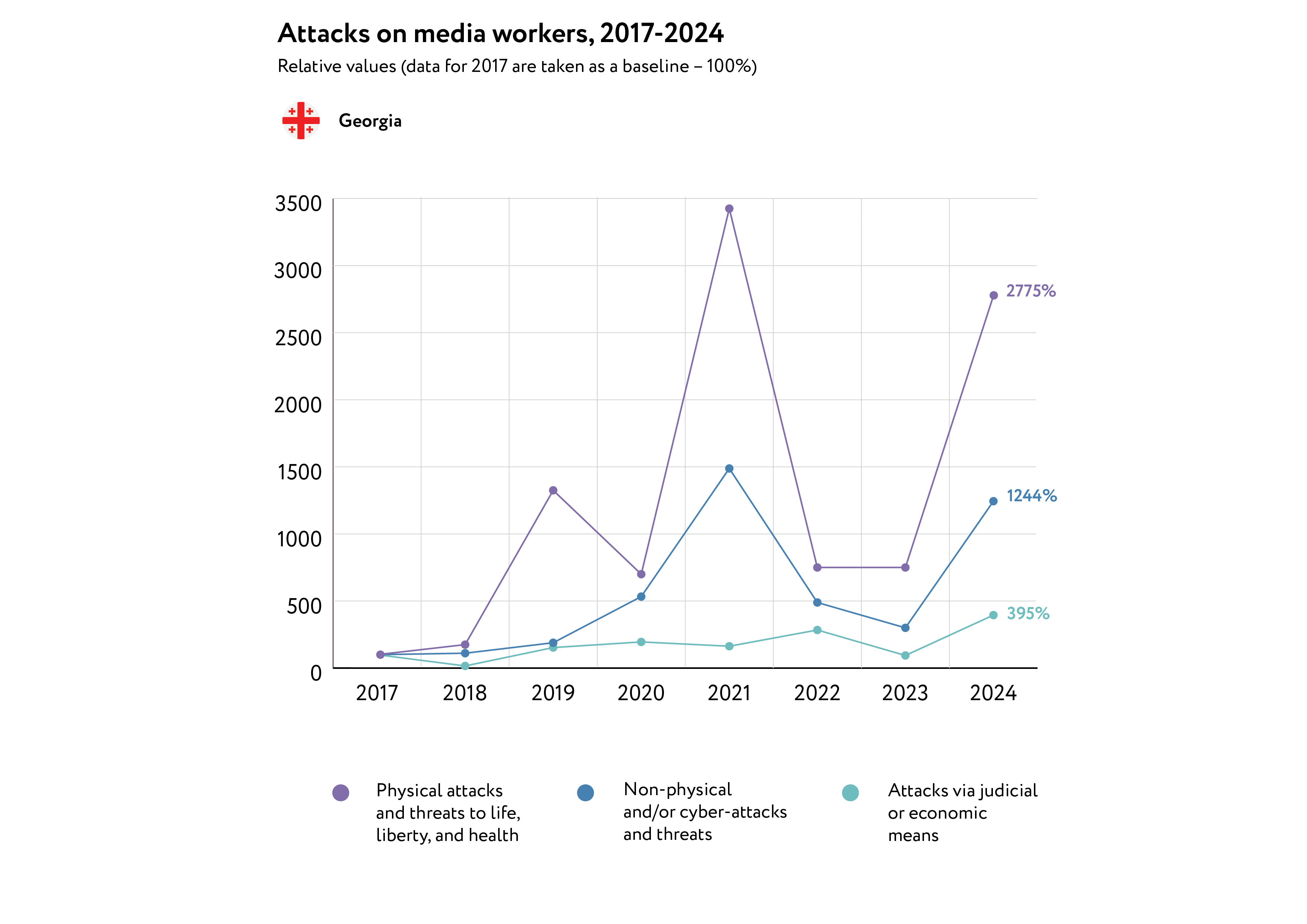
Besides physical pressure being put on media representatives, many journalists, photographers, and cameramen reported that their equipment was either damaged or confiscated by the police when the protests were being dispersed and that the equipment was never returned to them.
Of 298 attacks, 112 were categorized as non-physical and/or cyber-attacks and threats. Government officials or people affiliated with the government used threats, bullying and intimidation to put pressure on media workers who were carrying out their normal functions. In 2024, many journalists became targets of hate campaigns labelling them as “agents”. These coordinated campaigns were conducted both online, by pro-government media and affiliated pages, and offline, with posters and banners in the streets, vandalised apartments and offices, and anonymous threatening phone calls.
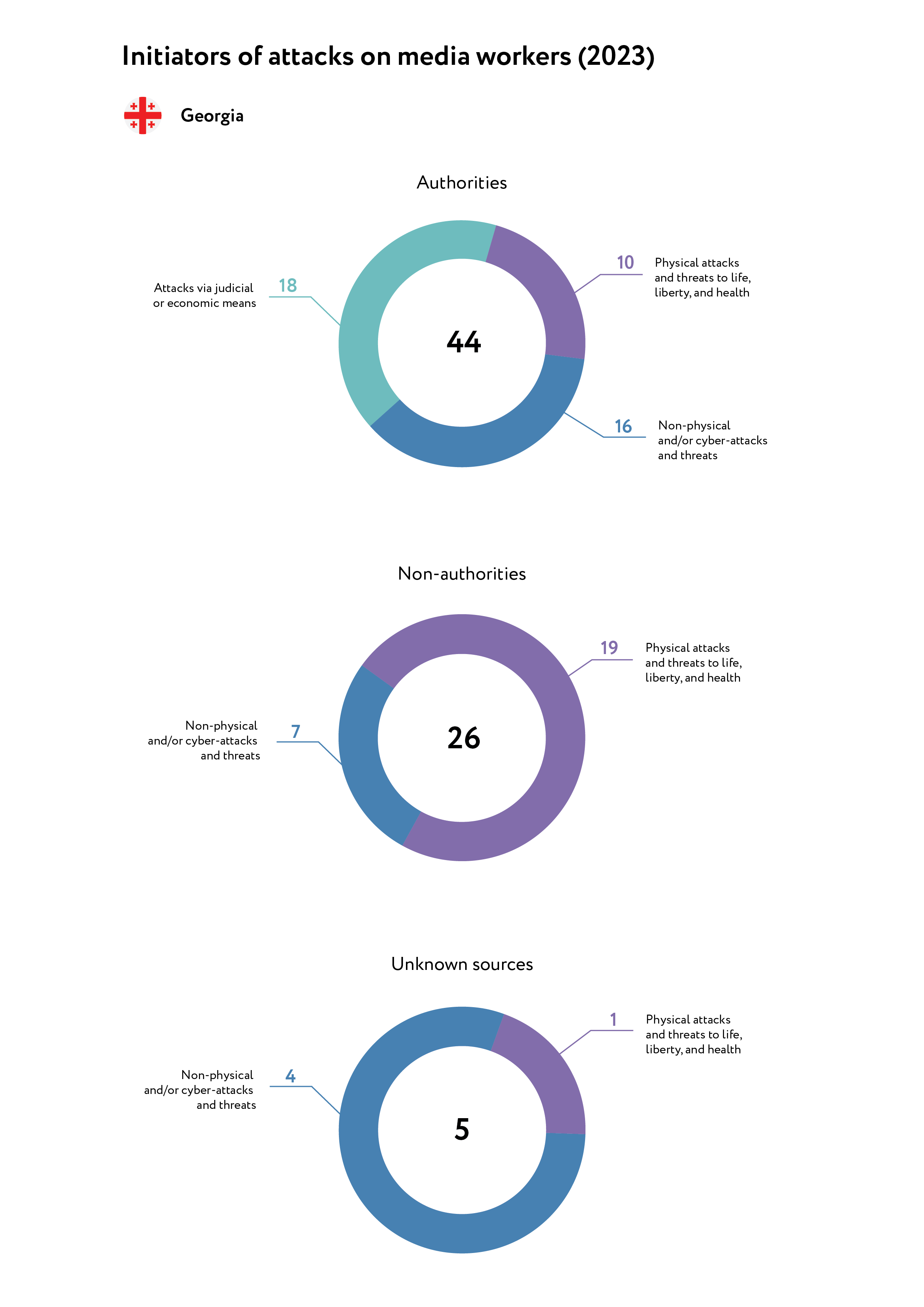
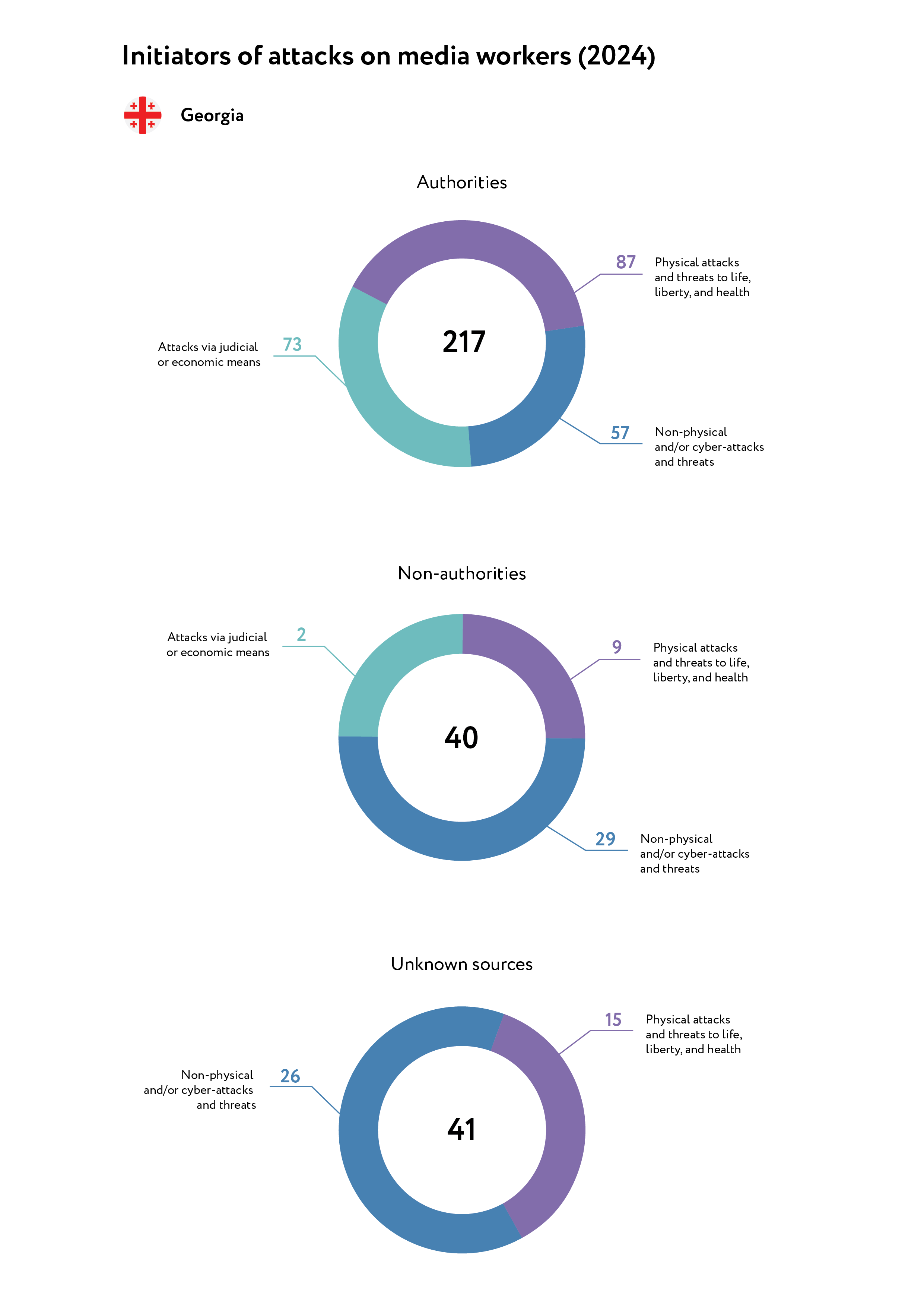
In the past, judicial and economic methods of pressure were not commonly used; but there has been a significant increase in such incidents in 2024 and since. These primarily included brief detentions, the initiation of administrative cases, and arrests.
As in previous years, journalists from opposition TV channels such as Mtavari Arkhi, Formula, and Pirveli were the primary targets. However, following the reintroduction of the Foreign Agents Bill the government also targeted independent online media outlets, most of which are donor-funded and therefore prime targets of the Bill.
In a further escalation of this trend, in January 2025 Mzia Amaglobeli, a veteran journalist and co-founder of two independent media outlets in Tbilisi and in Batumi, Netgazeti and Batumelebi, was arrested in Batumi during anti-government protests. In a letter transmitted through her lawyers, Amaglobeli announced: “The charges against me today are the product of repressive, treacherous, and violent processes targeting humanity, freedom of speech, and expression.” Amaglobeli faces charges of assaulting a police officer, which carries a sentence of up to seven years in prison.
Over 300 journalists signed a statement calling for her release. The embassies of 14 countries that are members of the Media Freedom Coalition also issued a joint statement calling for her immediate release.
4/ PHYSICAL ATTACKS AND THREATS TO LIFE, LIBERTY AND HEALTH
In 2023-2024, 141 physical attacks and threats to life, liberty, and health were recorded, with 111 of these incidents documented in 2024. Of these, 87 were committed by representatives of the authorities. While all documented attacks were non-fatal, in 2023, one incident of abduction, or illegal deprivation of liberty was recorded:
- On 26 January 2023, Tamta Dolendzhashvili, an investigative journalist with Pirveli TV, was taken hostage while filming a report on an illegal company dealing in Russian rubles. She was attacked and locked in a room by company employees, who demanded that in order to be released she must erase her footage. She was freed by a police patrol unit.
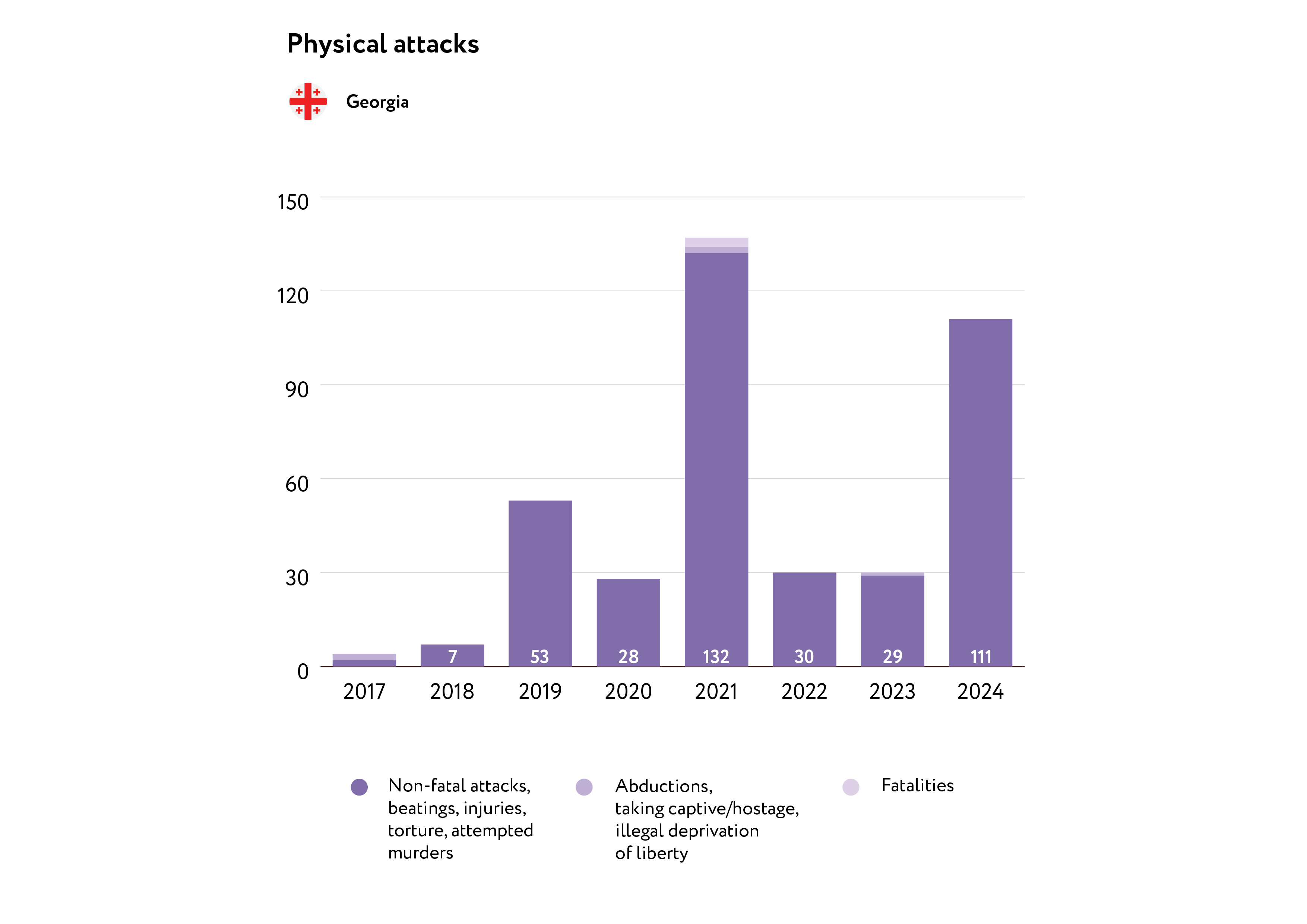
Cases of physical violence against journalists can be divided into two categories:
1) Attacks by Individuals Not Directly Connected to the Authorities: The attacks from groups, who are locally referred to as titushki (Ukrainian slang used to describe plainclothes agents of the security forces), occurred mostly during the protests in November-December 2024. Some examples of these attacks are presented below:
- On 26 October 2024, a camera crew from the media outlet TV Pirveli was attacked at a polling station in the village of Kvemo Khodasheni, in the Kakheti region. The crew, which included the journalist Mariam Makasarashvili and cameraman Nukri Kafiashvili, recorded unknown individuals registering voters as they arrived at the polling station. These individuals were also distributing money. Angered by the filming, one man destroyed the camera and attacked the operator, who required medical assistance.
- On 6 December 2024, Mindia Gabadze, a journalist of Publika.ge, was assaulted by unidentified individuals. Gabadze told Radio Tavisupleba (RFE/RL) that initially one individual punched him in the face, and then several others joined in and hit him. Gabadze was wearing a press badge and was clearly identifiable as a journalist. Gabadze sustained injuries to his face and concussion and was hospitalized.
- On 7 December 2024, unidentified masked individuals, reportedly affiliated with the government, attacked a TV Pirveli camera crew – journalist Maka Chikhladze and cameraman Giorgi Shetsiruli. The incident occurred while the crew was broadcasting live near the site of the protest. In video footage from the scene, an unknown masked individual is seen sneaking up behind Chikhladze, grabbing her, and throwing her to the ground. Shetsiruli was kicked in the head. They were both hospitalised.
- On 23 December 2024, Eliso Janashia, a journalist and founder of the social enterprise Limen, accused Georgian Dream activist Nineli Kulonava of physically assaulting and mistreating her. Janashia reported that Kulonava grabbed her by the hair, causing a scalp injury that required emergency medical attention.
2) Targeted Attacks by Police or Government Officials: The majority of these attacks occurred while journalists were covering protests against the Foreign Agents Bill and rallies following the statement of Prime Minister, Irakli Kobakhidze, to halt Georgia’s EU integration process. Some examples of these attacks are below:
- On March 8, 2023, at least 10 media workers suffered injuries during the dispersal of a rally on Rustaveli Avenue in Tbilisi. Journalists and camerapersons were exposed to tear gas used by the riot police to halt a protest. In one case a gas grenade exploded at a journalist’s feet. Riot police frequently obstructed the work of media representatives and assaulted them, including Aleksandre Keshelashvili, a reporter fromPublika’s; Tea Tetradze, a journalist for Formula TV; and cameraman Nika Kokaia. A journalist for Netgazeti, Mikheil Gvadzabia, was physically assaulted by a special forces officer who knocked the phone out of his hand.
- On 16-17 April 2024, several journalists were injured as a result of riot police using force against protesters and journalists outside the parliament building: Tabula journalist Giorgi Badridze, Publica journalist Aleksandre Keshelashvili, and Aprili Media journalist Giorgi Baskhajauri. OC Media journalist Mariam Nikuradze was documenting riot police officers beating protesters. The police prevented her from doing so, pushed her, and demanded she leave the area.
- On 1 May 2024, Robi Zaridze, a journalist with the investigative team iFact, was beaten by several police officers during the mass dispersal of a protest against the foreign agents bill and then taken to a detention van with other protesters. The journalist sustained multiple injuries. He was released from the van, but police damaged his phone. Police officers also grabbed Dea Mamiseishvili, a journalist from Mtavari TV, by the throat. Among other injured media workers were freelance photographer Giorgi Nakashidze; Zuka Chkhivrkia, a camera operator for Mtavari TV; Avto Meskhi, another camera operator for Mtavari TV; and Cnews journalist Giga Gelkhviidze.
- On 14 May 2024, police officers hit photojournalist Giorgi Zhamerashvili with a baton, while he was covering a protest on Rustaveli Avenue against the Foreign Agents Bill.
- On 29 November 2024, shortly after PM Kobakhidze announced the halting of the EU-integration process, Aleksandre Keshelashvili, a journalist of Publika, was detained and beaten up. As a result of his injuries, Keshelashvili required surgery on his nose. Police took away his two digital cameras and never returned them.
- During coverage of the same protest, Mariam Gaprindashvili, a reporter for the Pirveli TV channel, sustained a head injury after being struck on the head by a blunt object.
- Davit Tsagareli, a journalist for RFE/RL’s Georgian Service, was attacked while he was broadcasting live near the Rustaveli subway station in downtown Tbilisi. “I was wearing an RFE/RL jacket, wearing a press badge, and it looked like I was a journalist. This was a deliberate attack.”
- A riot police officer assaulted Guram Rogava, host of Formula TV, during a live broadcast. The officer struck him from behind, causing him to fall and sustain head and neck injuries. The journalist was hospitalised and spent months recovering.
- TOK TV journalist Filipe Tsereteli was injured by a gas capsule fired at him. “They released about 5 capsules. On Besiki Street, where we were, only journalists were present, around 5-7 people. No protesters were there at that time.”
- On 30 November during a protest near the Parliament building, special forces attacked RealPolitika journalist, Aka Zarkua. “About ten special forces officers surrounded and beat me until they got tired. I won’t even mention the verbal abuse. At one point, their commander arrived and tried to shove my press badge into my mouth. Fortunately, they didn’t manage to seize my phone, and the live stream remains on RealPolitika’s page,” Zarkua wrote.
- Photographer Mirian Meladze shared on his personal Facebook page that while documenting the anti-government protest in Tbilisi he was struck by a rubber bullet fired by riot police.
- Vano Gorgishvili, a photographer for Interpressnews, also reported being struck by a rubber bullet during the dispersal of the same protest outside the Georgian parliament.
- Police seized the camera of photographer Giorgi Gamgebeli after beating him during the dispersal of an anti-government protest. Gamgebeli sustained a severely sprained leg and a split lip in the attack and required multiple operations on his leg.
- On 2 December 2024, during a pro-EU demonstration, Publica journalist Natia Amiranashvili was physically assaulted by police while recording the arrests of protesters.
- TV Pirveli cameraman Niko Kokaia was affected by tear gas deployed by riot police and required medical assistance.
- Giorgi Nergadze, a cameraman for the pro-government TV station Rustavi 2, was injured near the Parliament building.
- Bakar Kvavadze, a reporter for JRC, was hit by a tear gas bullet during the dispersal of the protest.
- Givi Mchedlishvili, camera operator of Mtavari Arkhi, was affected by tear gas deployed by riot police officers.
- Keta Tsitskishvili, a journalist of Mtavari Arkhi, was injured during clashes with police while they were arresting opposition leaders outside the Marriott Hotel.
5/ NON-PHYSICAL AND/OR CYBER-ATTACKS AND THREATS
During this period, at least 139 incidents were recorded under the category of non-physical and/or cyber-attacks and threats, with 112 documented solely in 2024. As in previous years, damage to/seizure of property and equipment and documents, and denial of access to information remained the main methods of pressure.
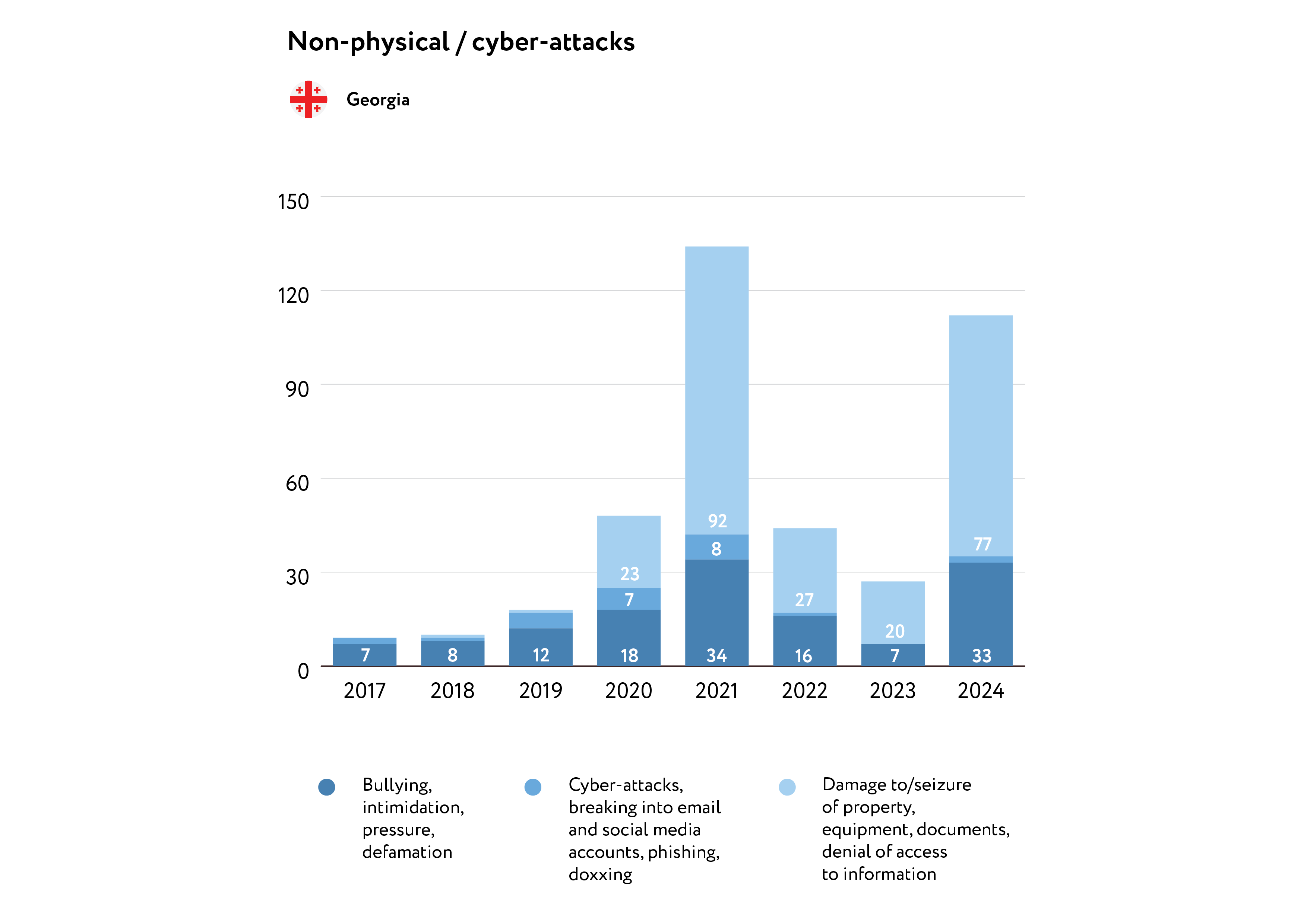
In the course of the protests in November-December, many media outlets and journalists reported damage to their equipment, while they were also physically attacked. There were frequent cases of professional equipment being seized and never returned. During the protests, at least 23 incidents were documented of damage to / seizure of property, vehicles, equipment, documents, journalistic materials, and print media circulation, including:
- On 26 October 2024, people affiliated with the Georgian Dream party seized a phone from Rapo Meskhidze, a journalist of Netgazeti.
- On 29 November 2024, during the anti-government protests, the equipment of the Formula TV camera crew in Batumi was damaged. Police also seized and damaged the phone of Natia Amiranashvili, journalist of Publika, who was filming violent arrests of protesters. OC Media founder and photographer, Mariam Nikuradze, was hit with a water cannon, causing her to fall and damage her camera.
- On 30 November 2024, a riot police officer first took and then threw away the phone of Ana Mskhaladze, journalist of Publika. After Mskhaladze told the police officer that she was a journalist and wanted to pick up the phone, she was hit in the head.
- On 2 December 2024, during the anti-government protests on Rustaveli, riot police officers tried to detain photographer and founder of OC Media, Mariam Nikuradze. After she told the officer she was a journalist, police pushed her against the wall, damaging her camera.
- Natalie Chkhartishvili from Chai Khana had her Handycam damaged while she was filming the detention of protesters.
- On 7 December 2024, police damaged the phone of Palitra News journalist Mariam Maziashvili while she was recording the police response to an anti-government protest, even after she identified herself as a journalist.
In 2023-2024, at least 35 incidents were documented, including cyber threats, relating to intimidation, pressure, and threats of violence and death:
- On 30 June 2023, the MP of the Georgian Dream ruling party, Levan Mgaloblishvili, verbally abused journalist Nanuka Kajaia. Later, the deputy denied the incident took place.
- On 25 July 2023, Formula TV journalist Irakli Tabliashvili reported receiving threats from unknown Russian-speaking callers for several days. The journalist filed this information to the Ministry of Internal Affairs.
- On 21 April 2024, Eka Sepashvili, a member of the parliamentary majority, insulted a Formula TV camera crew and threatened to revoke their parliamentary accreditation if they broadcast an interview with her.
- On 8 May 2024, unknown people called Natia Kuprashvili and threatened her with assault. They identified the address where the journalist was living and said they were waiting for her at her apartment.
- On 9 May 2024, Nino Zuriashvili, head of the investigative documentary outlet Studio Monitor, and Gela Mtivlishvili, editor-in-chief of the independent website Mountain News, said that unknown individuals had covered the entrances to their offices with posters and graffiti denouncing them as “foreign agents”. A day later, an unknown individual damaged Nino Zuriashvili’s car. Additionally, insulting and hateful posters were affixed to the wall of her house. Similar posters with offensive content were also displayed in the building housing Studio Monitor’s office.
- On 23 October 2024, journalist Ketevan Mosiava was trying to film how people were being transported from Rustavi to Tbilisi for the ruling Georgian Dream’s final rally ahead of the parliamentary election on 26 October 2024. Karlo Nodia, an employee of the Rustavi municipality, restricted the journalist from filming and threatened him with a physical attack.
- On 29 November 2024, police officers verbally abused and insulted Mtavari Arkhi journalist Keta Tsitskishvili live on TV while she was reporting on the anti-government protest outside the Georgian parliament.
- On 16 December 2024, Adjara and Batumi police officials threatened and interrupted the work of Eter Turadze, editor of Batumelebi, after she asked about the use of physical force against protesters in Batumi.
- On 18 December 2024, unidentified masked people insulted and interrupted the work of TV Pirveli journalist Nanuka Kajaia, who was covering the anti-government protest outside parliament. Police didn’t react to the incident.
On 26 October 2024, election day, dozens of journalists were obstructed when trying to film inside different polling stations:
- A group of people outside polling station № 17 in Batumi prevented camera crews from Mtavari Arkhi and Formula TV from entering. They also insulted the journalists.
- In Gldani District, unknown people, including Georgian Dream activists, verbally insulted Mindia Gabadze, a journalist from Publika, where he was covering the election process.
- In Marneuli, Vladimer Chkhitunidze and Tiko Davadze of Radio Marneuli were verbally assaulted by a polling station observer and their filming of the election process was restricted.
- In Batumi, Mtavari Arkhi reported that their and Formula TV’s camera crews were attacked at polling station № 17 by a Georgian Dream coordinator. He then restricted the crew’s entry into the polling station.
- Eter Turadze, the editor of Batumelebi was covering the election in Batumi when unknown people interfered with her work and demanded that she stop filming.
- A Mtavari ArkhiTV crew were covering the election in the village of Magharo. A representative of the local City Hall insulted them and covered the camera with his hand.
Among other recorded incidents:
- On 28 March 2023, the Georgian government, as well as its media outlets, launched a defamation campaign against journalists from Palitra Media. Mamuka Mdinaradze, an MP of the ruling party, also accused them of partisanship in favour of the biggest opposition party, while pro-government TV spread false information about the media outlet’s source of funding.
- On 13 June 2023, journalist Vasil Dabrundashvili reported a break-in at his house and said that important documents had been taken. The stolen documents included the decision of the Tbilisi Prosecutor’s Office to recognise him as a victim of illegal wiretapping and secret surveillance in 2022.
- On 15 June 2024, media outlet Mtis Ambebi and its founder, Gela Mtivlishvili, became targets of a cyber-attack on Facebook: “… our investigative films and critical whistleblower materials covering the Shovi tragedy, Chiatura ecological disaster, occupation of Racha forests, Balda Canyon, corruption within the Protected Areas Agency, and other vital topics were unexpectedly deleted from our Facebook page.”
- On 17 December 2024, at a press conference held at the government administration, a journalist from the TV channel Imedi asked Irakli Kobakhidze about the collaboration between the media platform Chai Khana and the USAID Civil Society Engagement Program. Since this information has never been made public, it had likely been obtained through illegal surveillance.
5/ ATTACKS VIA JUDICIAL AND/OR ECONOMIC MEANS
In 2023-2024, 93 attacks via judicial and/or economic means were registered, 75 of which took place in 2024. While in 2023, the main method of pressure was banning foreign media workers from entering the country, in 2024 trends have shifted significantly. Among the most widespread methods of pressure are fines following administrative offences (19); criminal and administrative prosecution (16); short-term detentions (7) and administrative arrests (5).
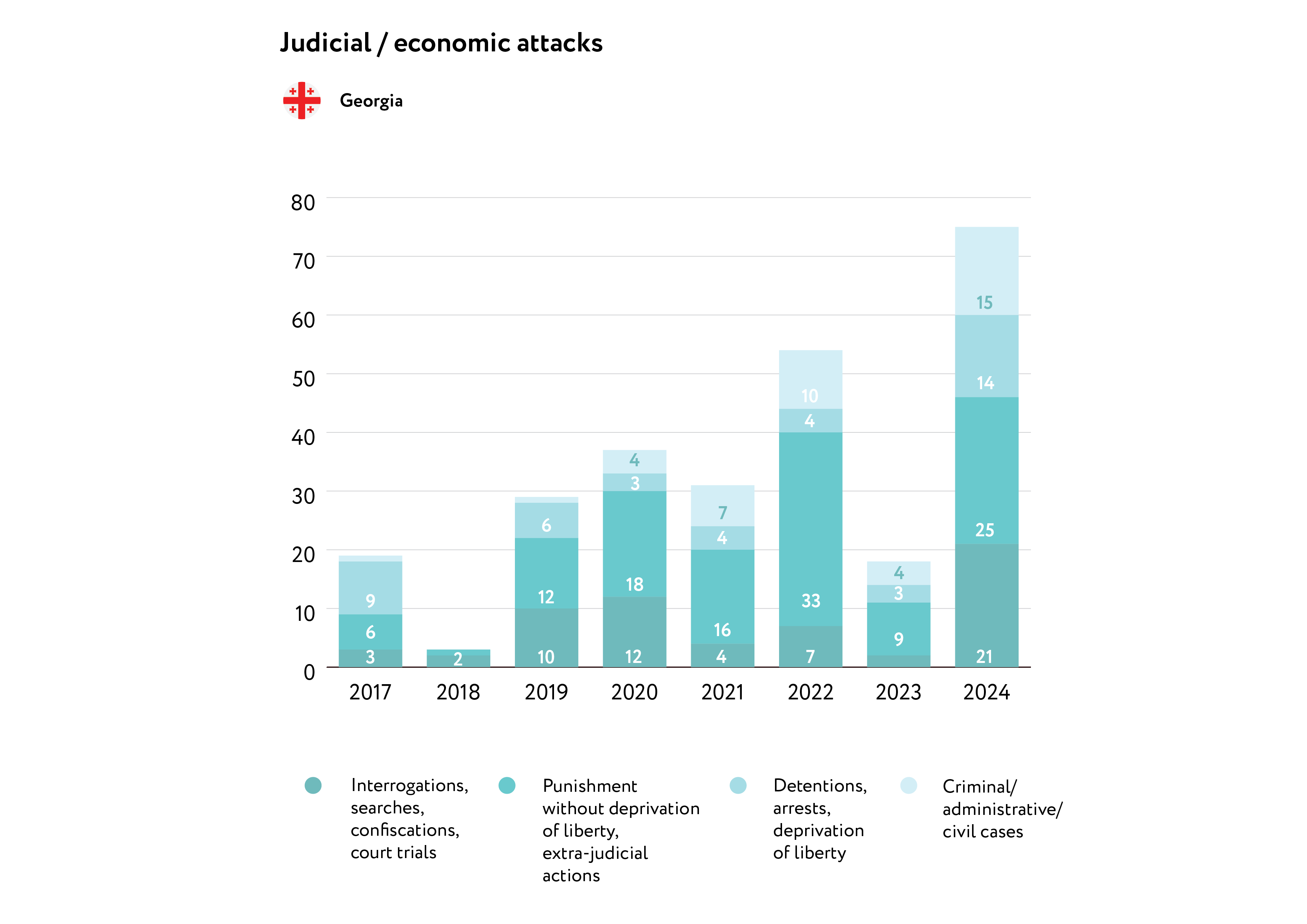
At least one journalist has been sentenced by the court to administrative arrest:
- On 12 December 2024, freelance photographer Luka Ghviniashvili was sentenced to seven days’ administrative arrest for “non-compliance with a lawful order from a law-enforcement officer”. According to Ghviniashvili, he was being followed by several individuals in plain clothes, and he ran to a nearby police car to seek assistance. However, the people pursuing him turned out to be uniformed police officers, who then arrested him.
At least seven media workers were detained and had an administrative fine imposed by the court:
- On 2 March 2023, Georgian opposition politicians and activists held a protest rally against the Foreign Agents Bill in front of the parliament building in Tbilisi. Several participants in the rally and journalists who were carrying out their professional activities were detained. Among them were Zura Vardiashvili, director of Public, and Tabula journalist Beka Dzhikurashvili. They were charged with minor hooliganism (Art. 166) and defiance of the legitimate demands of law enforcement officials (Art. 173). In April 2023, the Tbilisi City Court fined both journalists 2,200 GEL ($876).
- On 31 January 2024, the Tbilisi City Court imposed a GEL 2,000 ($750) fine on Gela Mtivlishvili, the founder and editor-in-chief of the Georgian news agency Mtis Ambebi [Mountain Stories] for disobeying the police.
- On 2 December 2024, police detained Giorgi Chagelishvili, a reporter for the independent news outlet Mautskebeli, while he was covering a protest. Police detained Chagelishvili for 48 hours. On 3 December, a court fined him GEL 2,000 for allegedly disobeying police.
- On 7 December 2024, Caucasian Knot correspondent Beslan Kmuzov was detained by riot police while reporting. Riot police confiscated Kmuzov’s phone. The court imposed a fine of GEL 2,000 on the journalist for disobeying the police.
- Also on 7 December 2024, police in Tbilisi arrested the journalist and anchor Beka Korshia from the Mtavari Arkhi TV channel and held him in custody on charges of disobeying law enforcement officials. The following day, he was brought to court, released, and fined GEL 2,200 ($850). After his release, Korshia reported that he had been physically assaulted.
- On 13 December 2024, during the coverage of a protest rally in Zugdidi, the director of the local TV station Metskhre Talgha and co-chair of the Georgian Regional Broadcasters Alliance, Gia Salia, was fined GEL 1,000 ($325) for driving his car. Salia said that a police car had followed him from Poti to Zugdidi, and told him to stop and get out of the car while they searched the vehicle.
At least seven media workers were detained and released without charge:
- On 18 November 2023, the police arrested 11 activists protesting in Tbilisi, along with Save Rioni Gorge and Mautskebeli journalist Rati Ratiani, who was streaming his report of the protest live on his Facebook page. The Ministry of Internal Affairs charged them with petty hooliganism and disobeying the police. The court fully acquitted the journalists.
- On 3 May 2024, Giorgi Badridze, the editor of Tabula, who was filming the police arresting protesters against the Foreign Agents Bill was detained by the police despite the journalist having a press badge. He was later released.
- On 16 November 2024, Giorgi Liponava, the co-founder of Formula TV, was forcibly apprehended by a plain clothes policeman during a protest outside the Central Election Commission building. He was released after the 48-hour period of administrative detention expired.
- On 19 November 2024, police officers physically attacked Sergi Baramidze, camera operator of Mtavari TV, when he was filming protesters being arrested, and briefly detained him at a police station. Baramidze was released after signing a document agreeing to appear if summoned; it is unclear if he’ll be charged.
- On 30 November 2024, riot police in Tbilisi detained Beka Beradze, producer of Radio Tavisupleba. Beradze, who was arrested near the site of the protest, was beaten during his detention. He was held at a temporary detention centre and released at dawn on 3 December.
- On 1 December 2024, police detained photographer Nikoloz Tabukashvili when he was covering the anti-government protest on Rustaveli Avenue.
During the pre-election period, the Communications Commission issued fines to independent TV channels for refusing to air the election campaigns of certain political parties, for example:
- On 13 September 2024, the Communications Commission of Georgia supported the ruling Georgian Dream party’s appeal against several opposition TV channels for refusing to place an election commercial. The commercial included photos of activists and civil society organisations with the following comment: “Say no to the moral degeneration of society and choose traditional values”. The TV channels had refused to place this commercial because it contained hate speech. The court fined TV Formula, Mtavari Arkhi and TV Pirveli GEL 5,000 ($1,850) each.
During the protests against the Foreign Agents Bill in 2024 at least two incidents of confiscation/seizure of equipment were recorded:
- On 17 April 2024, during a protest outside parliament against the Foreign Agents Bill, Tabula journalist Giorgi Badridze was beaten, and his phone was taken by the police. He then used his work phone, and the police attempted to seize that phone as well.
- On 14 May 2024, while covering a protest against the Foreign Agents Bill outside the parliament, Indigo journalist Saba Sordia reported that a police officer unexpectedly seized his camera.
At least ten foreign journalists were denied entry to Georgia:
- On 12 January 2023, at the Sarpi border between Georgia and Turkey, Azerbaijani freelance journalist Seymour Hazy was denied entry without any explanation.
- On 5 February 2023, a former SMM editor for Team 29, Elena Skvortsova, was once again denied entry to Georgia for “other reasons”. The exiled Russian journalist intended to meet her family in Georgia, and showed the border guards her Czech residence permit. Skvortsova was previously denied entry to the country on 19 December 2022.
- On 19 February 2023, border guards at Tbilisi airport told Russian writer and journalist Filipp Dzyadko that he could not enter the country because “their computer was frozen”. Dzyadko believes this refusal was linked to his former journalistic work for Dozhd TV (TV Rain), the now-defunct newspaper “Bolshoy Gorod”, and an anti-war novel he published in April 2022. He had been residing in Georgia since March 2022.
- On 14 March 2023, Aleksandra Shvedchenko, a Russian journalist with the exiled Russian broadcaster Dozhd TV, was denied entry to Georgia. She was put back on a plane to Riga, Latvia. The journalist had been living in Tbilisi for a year.
- On 18 April 2023, Russian publicist Aleksandr Arkhangelsky was denied entry to Georgia and deported. He said he was “thoroughly questioned about Abkhazia”. The reason for the deportation was not provided.
- On 26 March 2024, Tajik journalist Anushervon Aripov, along with several other Tajik citizens, was denied entry into Georgia and was forced to return to Vladikavkaz, Russia. No reason was provided.
- On 15 September 2024, Belarusian journalist Andrei Mialeshka was denied entry to Georgia, where he has lived for the past three years after facing political persecution in Belarus. He was denied entry to the country under the clause “other cases stipulated by Georgian legislation”, an official pretext used in similar cases in the past.
- On 17 September 2024, Arsen Kharatyan, an Armenian journalist, the founder and editor-in-chief of an independent non-profit bilingual Georgian-Armenia media platform Aliq Media based in Tbilisi, and a former advisor to the Armenian Prime Minister, Nikol Pashinyan, was denied entry to Georgia, detained for four hours and forced to return to Europe with no explanation.
- On 22 October 2024, Czech journalist Ray Baseley was denied entry to Georgia without any explanation.
- On 26 October 2024, Stephan Goss, a Swiss journalist with IFJ Global was denied entry to Georgia on election day without a reason.
Among other incidents reported:
- On 24 June 2024, influential businessman Giorgi Kapanadze (Rizha), who has strong ties with the ruling party, filed a defamation lawsuit against eight journalists from four media outlets, including Radio Liberty investigative journalist Giorgi Mgeladze. The lawsuit is against Formula TV, Main Channel, TV First, and Radio Liberty. Kapanadze’s lawsuit referred to material from 2020. The preparatory session was held on 27 June 2024 but was postponed as the plaintiff did not attend the session.
- On 3 August 2024, Azerbaijani journalist Afgan Sadygov was arrested in Tbilisi, two weeks after Georgian border guards had barred him from leaving the country unless he travelled to Azerbaijan. On 28 November 2024, the Tbilisi City Court approved his extradition to Azerbaijan. On 16 January 2025, the European Court of Human Rights issued a decision to temporarily bar Georgia from extraditing Sadygov. On 31 January 2025, the Tbilisi court extended Sadygov’s arrest for another three months.
ANNEX 1: OPEN SOURCES USED FOR GATHERING DATA (GEORGIA)
- Caucasian Knot – a news and analysis website about events in the Caucasus, in the Russian language;
- CASE – a coalition of non-governmental organisations from across Europe united in recognition of the threat posed to public watchdogs by Strategic Lawsuits Against Public Participation (SLAPPs);
- Civil.ge – a project by the UN Association of Georgia, delivering news and analysis since 2001;
- European Centre for Press and Media Freedom(ECPMF) – a non-profit organisation that promotes, protects and defends the right to a free media and freedom of expression throughout Europe;
- Freedom House – an international human rights NGO that evaluates and publishes reports on the level of freedom in 210 countries and territories worldwide, including on freedom of speech and media activity;
- First Channel – the news website of the Public Broadcasting of Georgia television channel, in the Georgian and Russian languages;
- Formula TV – a news television channel, in the Georgian language;
- Georgian Charter of Journalistic Ethics – an independent union of journalists aimed at raising the social responsibility of media through the protection of professional and ethical standards, and the development of self-regulation mechanisms;
- International Republican Institute (IRI) – an American nonprofit organisation. Its public mission is to advance freedom and democracy worldwide by helping political parties to become more issue-based and responsive, assisting citizens to participate in government planning, and working to increase the role of marginalized groups in the political process, including women and youth;
- IPN (InterPressNews) – a news website about events in Georgia, in the Georgian, English, and Russian languages;
- Mtavari Arkhi – a television channel, in the Georgian language;
- Mautskebeli – a news outlet about events in the Georgian language;
- Netgazeti.ge – a news and analysis website about events in Georgia, in the Georgian language;
- Newsreport.ge – a news website about events in Georgia, in the Georgian language;
- News Georgia – a news website about events in Georgia, in the Russian language;
- OC-Media – an independent online news platform covering news from the North and South Caucasus regions;
- On.ge – a news website about events in Georgia and the Caucasus, in the Georgian language;
- Radio Tavisupleba – the website of Radio Liberty’s Georgian service, in the Georgian language;
- Reporters Without Borders — an international non-profit and non-governmental organisation with the stated aim of safeguarding the right to freedom of information;
- TV Pirveli – a television channel, in the Georgian language.
